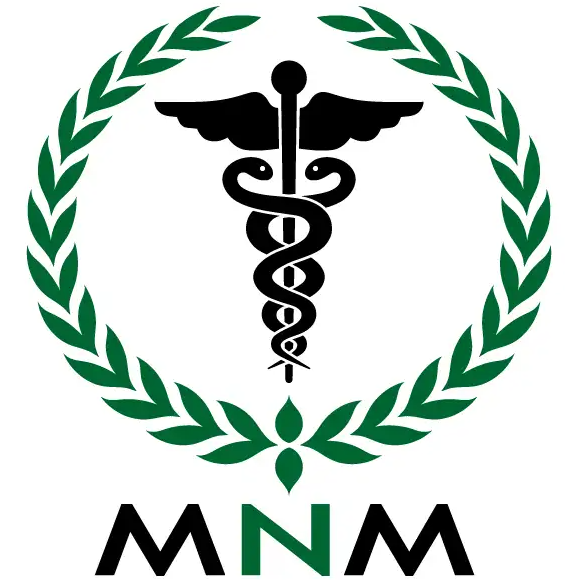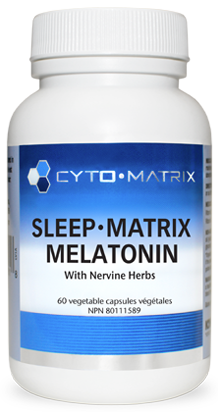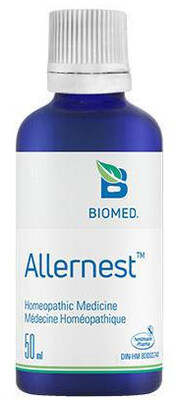
Sleep Matrix by Cyto-Matrix
Sleep-Matrix Melatonin
- A formula designed to target multiple factors that contribute to insomnia, leading to reduced sleep latency, less waking and improved sleep quality
- Melatonin resets the circadian rhythm and is particularly indicated for shift-workers or individuals wanting to prevent jet lag, capable of improving all sleep parameters
- Nervine herbal extracts of Valeriana officianalis, Passiflora incarnata and Melissa officinalisare included to positively modulate the body’s stress response and to calm thenervous system
- Amino acids, GABA and L-theanine, help to acts as an inhibitory neurotransmitters that reduces nervous system excitability, increase alpha-brain waves and decrease the time needed to fall asleep
Poor sleep is encountered by more than 1 in 3 adults at some point during their lifetime, with prevalence and severity only increasing as we age. Many of these individuals resort to over-the-counter medications, pharmaceutical drugs, alcohol or other substance abuse as a means to improving their problematic sleep. Unfortunately, these substances may just be contributing to the growing list of chronic health concerns that are already linked to ongoing sleep issues such as heart disease, impaired immunity, metabolic dysfunction and even low bone mineral density. Sleep-Matrix Melatonin offers an effective, natural solution for your patient’s sleep concerns.
Melatonin is the hormone that regulates our circadian rhythm, the cycle that dictates when we should be awake and when we should be asleep. It is naturally produced in the pineal gland and has well-established benefits as a sleep aid supplement. Clinical trials have found that melatonin can reduce the time it takes to fall asleep and improve the ability to stay asleep, increasing total sleep time and restfulness. Melatonin is particularly indicated for individuals that work irregular day and nighttime hours or to prevent jet lagin people that travel often.
Various herbal extracts can support the use of melatonin and also support sleep parameters. One of the best studied herbs for insomnia is Valeriana officianalis, commonly known as valerian root. In vitro data has shown that valerian root may stimulate gamma-aminobutyric acid (GABA) release into the brain and simultaneously block its reuptake. This may explain why valerian root has shown comparable effectiveness to a benzodiazepine medication for sleep quality after a 4-week intervention, yet with fewer side effects. One meta-analysis examined 16 studies for valerian root on sleep quality, finding a relative improvement in sleep markers of 80% compared to placebo in a subset of trials.
Passiflora incarnata and Melissa officinalis are two other calming herbs that have been shown to stimulate GABA receptors and positively regulate stress, respectively. Studies examining Passiflora incarnata have shown that even just 7 days of consumption as a tea can improve sleep parameters and that its supplementation can acutely reduce stress. Finally, Scutellaria lateriflorais included for its nervine effects and GABA-receptor activation, primarilydue to the active ingredient baicalin.
In addition to melatonin and herbal extracts, amino acids can play a positive role in alleviating insomnia. GABA is a well-known inhibitory neurotransmitter that has been found to relax the mind and reduce the amount of time it takes to fall asleep. Likewise, L-theanine is a single amino acid, naturally found in green tea, that is well-known to calm the mind and improve focus. Research has found that L-theanine can increase levels of various neurotransmitters in the brain, such as serotonin, dopamine and GABA, while also blocking excitatory glutamate receptors. Ultimately, L-theanine increases alpha-brain waves and improves stress markers such as heart rate, blood pressure and salivary immunoglobulin A.
Each of these aforementioned ingredients are included in Sleep-Matrix Melatonin to address multiple possible causes of poor sleep in individuals suffering from insomnia. Sleep-Matrix Melatonin is an evidence-based blend that is indicated for increasing sleep latency, duration and quality.60 vegetable capsules per bottle
| Ingredient | Amount |
|---|---|
| Melatonin (N-acetyl-5-methoxytryptamine) | 2mg |
| Lemon balm extract (herb top, Melissa officinalis) 5% rosmarinic acid | 125mg |
| L-theanine | 100mg |
| Valerian extract (root, Valeriana officinalis) 0.8% valerenic acid | 56mg |
| Passionflower extract (herb top, Passiflora incarnata) 10:1, DHE 500mg | 50mg |
| Skullcap extract (herb top, Scutellaria lateriflora) | 50mg |
| GABA (4-Aminobutyric acid) | 50mg |
Non-Medicinal Ingredients: Microcrystalline cellulose, magnesium stearate, maltodextrin.
Capsule: hypromellose.






